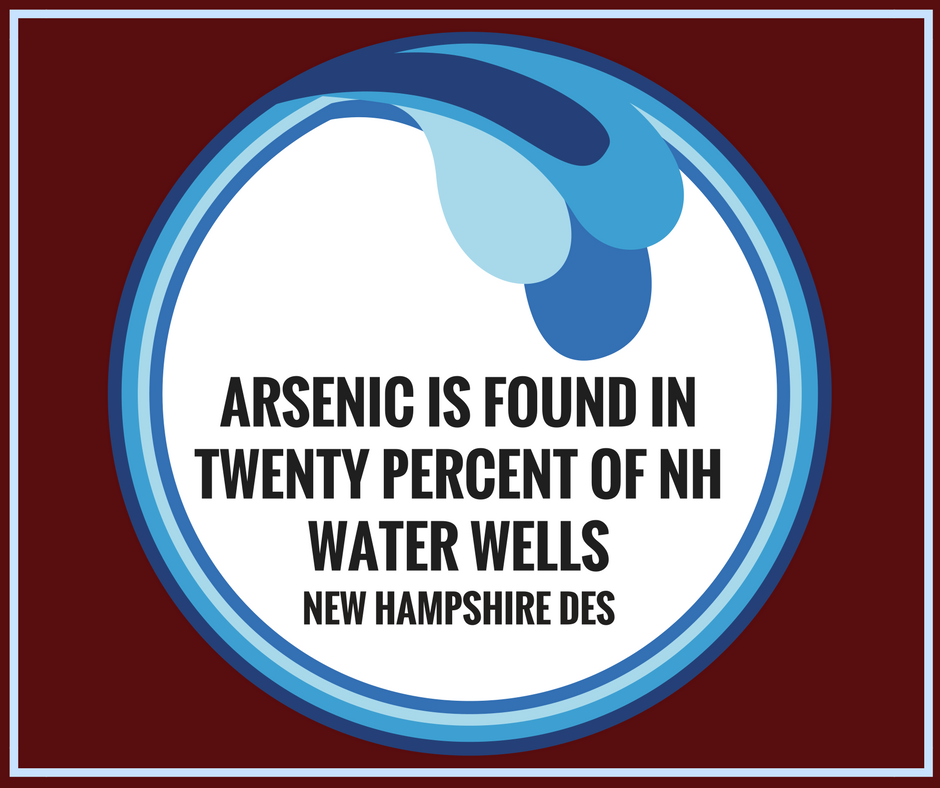Arsenic Is Found in Twenty Percent of NH Water Wells
One in Five Private Water Wells in NH May Contain Arsenic
Well water health and safety are concerns for every homeowner with a water well. While here in New England we are blessed with outstanding geology and plentiful supplies, we hear frequent reports of man-made contaminants like MBTE and PFOA effecting wells in our region.
Recent studies have shifted the focus to natural contaminants as testing has uncovered high levels of arsenic and uranium in wells in several communities throughout New Hampshire including Weare and Epsom.
The New Hampshire Targeted Arsenic and Uranium Public Health Study
In a long planned study of arsenic and uranium contamination levels, 30 households on private wells in five central New Hampshire towns are being asked to provide samples of their water to help determine how much of these contaminants are getting into homes. It's estimated that up to 20% or one in five New Hampshire homes supplied by private wells may be effected by naturally occurring, elevated levels of arsenic and uranium. Homeowners are also being asked to provide urine samples to show how much is making its way into their bodies through their drinking water.
Because arsenic and uranium are odorless and colorless, many wells may be effected without the homeowners knowledge. The test was initially launched through a volunteer effort in a couple of local towns and based on the results is being expanded and future participants are being selected in a more randomized way.
This study is one of several being made by state agencies and a group at Dartmouth College to understand and tackle this difficult public health problem to improve the quality of drinking water supplies.
The Difficulty of Determining the Extent of Arsenic Contamination
Unlike many states that are primarily served by larger systems that are easier to test and treat, in New Hampshire about 40% of the population is served by private water wells. Because of this, and the fact that private well testing is not mandated, it's hard to get a sense of exactly how safe New Hampshire drinking water is. This can be made even more difficult because while one well can be perfectly fine, a neighboring well may be of concern.
In New Hampshire, there is a reason for concern. Based on geology and sampling, officials fear that over 50,000 people could have elevated arsenic levels in their well water. Higher levels of uranium can be a by-product of arsenic contamination.
At one point, most homes in New Hampshire had “shallow dug wells” which went down 40 or 50 feet into soil and sand to reach the aquifer. These types of wells were susceptible to surface pollution and many were found to have MBTE, PFOE, and other man-made contaminants. As a result, many homes switched over to deep drilled wells that reached into the bedrock. Drilled wells are safe from most surface pollutants as surface water would have impurities removed as it percolated through layers of sand, soil, and rock. They can still be subject to some industrial pollutants that can seep down over a long period of time as evidenced by problems in Merrimack and the Seacoast towns concerning industrial chemical pollution.
The problem today is less from man-made pollutants than from naturally occurring ones. The geology of our region includes levels of arsenic, uranium, and radon that are produced by the large amounts of rock under our state. These elements are all odorless, colorless, and tasteless making them impossible to detect without testing.
These elements do not cause immediate illness, so you can be consuming them over a long period of time before symptoms manifest. That's why many homeowners dismiss the problem or are not even aware of it. And that's why organizations like the DHHS and Dartmouth Toxic Metals Program are reaching out to homeowners.
DHHS and Dartmouth are being joined by the Department of Environmental Services in tackling the problem of private wells. The DES has created an interactive website called “Be Well Informed” to help homeowners understand the importance of testing. Dartmouth has created a website called Arsenic and You and it's also why the DHHS biomonitoring program includes a questionnaire to collect lifestyle data that can help to explain the results.
The biomonitoring program already exists in Bow and Dunbarton and cards were recently mailed out informing residents of Deerfield, Epsom, Goffstown, New Boston and Weare requesting participation. If you receive one in the mail, don't ignore it! Just because you can't see a problem doesn't mean it doesn't exist!
If you live in one of these towns or are concerned about the quality of your water well, give the experts at Skillings & Sons a call. We're available to help you arrange testing and can help you to analyze the results. These naturally occurring contaminants can be removed through various forms of water treatment. Let us help you to understand your options and the costs of installing a water treatment system to keep your home's water clean, pure and safe.

